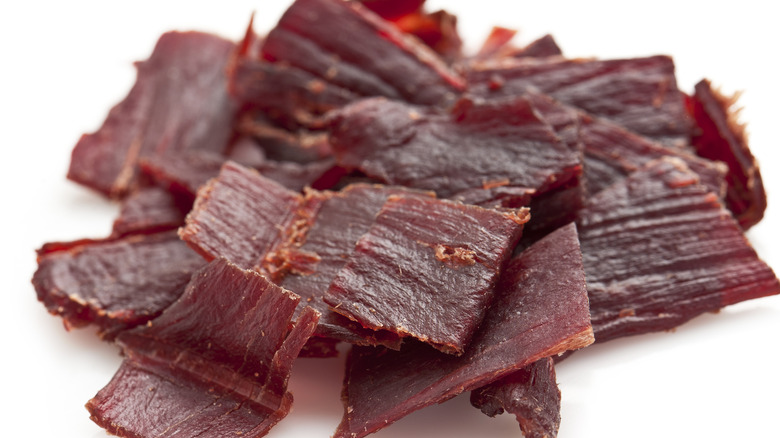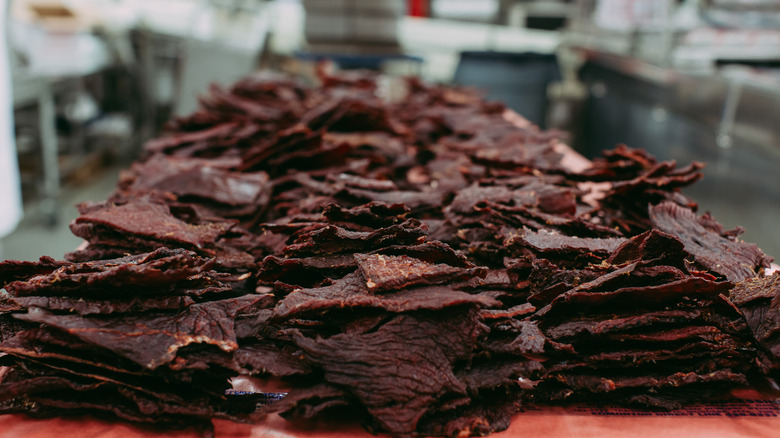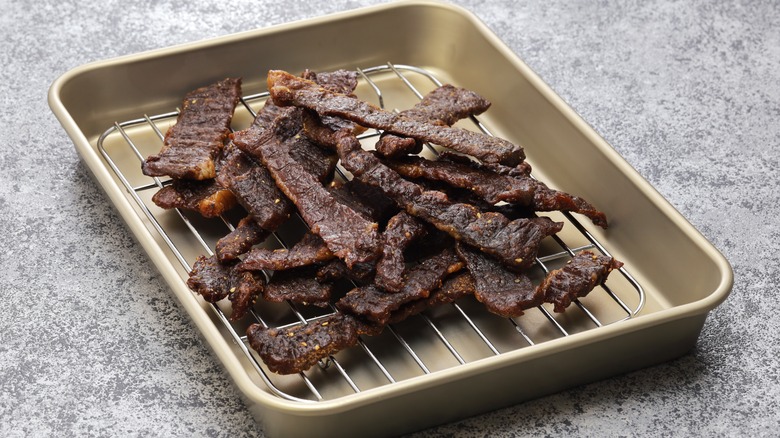Why Store-Bought Beef Jerky Is So Expensive
Beef jerky is savory, chewy, and satisfying, but unfortunately it has a fairly high price tag. At around $20 per pound for a bag of beef jerky, it's somewhat shocking how much it costs, especially considering how fast you can demolish a small bag of the tasty dehydrated meat. Due to its high cost, this addictive snack is more of a treat than an everyday grocery item, often strategically placed near the checkout to encourage last-minute impulse buys. But what makes this seemingly simple snack so expensive anyway?
The answer lies in the quality of the beef, the time-consuming process of making jerky, and the fact that the beef shrinks significantly when it becomes jerky. According to Jack Link's, one of the most popular beef jerky brands found in grocery stores, "the price of lean meat (and other factors like [their] gourmet blend of spices, signature hardwood blend of wood chips, etc.) add to the overall cost of each bag." The process of making beef jerky differs depending on the manufacturer (large commercial brands vs. smaller craft retailers), but it generally involves slicing thin cuts of lean beef, adding marinade and seasonings, curing the meat to preserve it, and cooking and dehydrating, or smoking, it to remove its moisture content. This time-intensive process can take multiple days, which contributes to its higher cost.
An expensive, time-consuming process
Beef Jerky is typically made with high quality, lean cuts that cost more than fatty cuts of beef, thus inflating the cost. Top and bottom rounds are popular cuts for beef jerky due to their leanness, tasty beefy flavor, and consistently large size that facilitates production. Some small-batch jerky makers may use more premium types of beef, such as grass-fed or organic, that inflate the cost even more.
Besides high-quality meat, it also takes a large amount of beef to make a small batch of jerky. Beef has a high water content, which is significantly reduced when dehydrated or smoked. For example, according to Mountain America Jerky, a 50-pound load of beef in their smokehouse results in just 23 pounds of jerky. So, the next time you are marveling at how little jerky there is in your expensive snack-size bag, it might help to remember that it was a much larger portion of beef before it was dried.
Finally, while large-scale jerky producers use industrial size dehydrators to make their jerky, if you're buying premium locally made or small-batch jerky there's a good chance it was smoked instead of dehydrated. Jerky made in a smoker is generally more tender than jerky made in a dehydrator machine, but it's also a more labor and time-intensive process that may raise the price.
Save money by making your own beef jerky
You can save money by making beef jerky at home since you aren't paying for labor, but the cost varies depending on the quality of beef you purchase. Eye of round is one of the best cuts of meat for making top tier beef jerky at home because it is tender, lean, and easy to cut into thin slices. (It's also an ideal cut for making the best roast beef sandwiches.) However, it tends to be a bit pricier than top or bottom round. That being said, various cuts of beef can be used to make jerky besides the round, including flank steak and skirt steak. Venison is also a popular choice since deer meat is leaner than cow meat. Just avoid fatty cuts that will result in unwanted gristle on your jerky.
There are various ways to make jerky at home — in a smoker (or a grill turned into a smoker), dehydrator, oven, or air fryer — and opinions vary on which method reigns supreme. Some say using a smoker is best since it can enhance the flavor, imparting a smoky flavor into the meat — however, it generally takes longer (6 to 12 hours) than a dehydrator (4 to 6 hours). Air fryers and ovens work well for small batches and typically take 3 hours. To save time in addition to money by making it at home, make the largest batch possible that will last for a long time.


